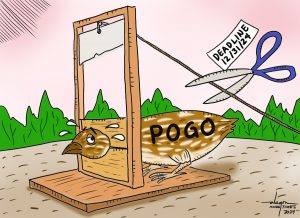There is a Buddhist saying that goes: “When the student is ready, the teacher will appear.”
I believe I am ready to learn and practice nonviolence because my teacher appeared this week in Davao City and he is no less than Dr. Paul Bueno de Mesquita, Professor Emeritus of the University of Rhode Island (URI), who served as Director of the URI Center for Nonviolence and Peace Studies.
Paul was introduced to nonviolence as an effective psychological method for personal and social transformation by Dr. Bernard LaFayette, a close associate of Dr. Martin Luther King, Jr. So from Dr. King who trained Bernard who then trained Paul who is now training me. The universe cannot be any clearer and louder in its message that I am, indeed, ready because it sent me a great teacher.
Awesome opportunities such as this do not happen by accident, of course. This happened to me because I followed my bliss, as mythologist and writer Joseph Campbell advised. It is also my feminist fairy godmother Irene “Tita Inday” Santiago’s favorite advice: “If you follow your bliss, you put yourself on a kind of track that has been there all the while, waiting for you…When you see that, you begin to meet people who are in the field of your bliss and they open the doors to you.”
I followed my bliss which is living a creative and meaningful life in the service of others.
Tita Inday, while following her bliss, found herself in India in 2019 and met Paul at a conference. They both decided that they would bring Kingian nonviolence to the Philippines. It was the last instruction of Dr. King to Bernard before he was assassinated to “internationalize and institutionalize nonviolence as a way of life.” So Paul now has the opportunity to do it with Tita Inday in her own country. Then the pandemic happened so the plan got shelved.
Fast forward to 2024. Paul said he would be free to come to the Philippines in April to do the Nonviolence Summer Workshop their Center conducts regularly as a four-week training course (that got compressed into three days for busy-but-quick-learner Filipino leaders). It’s a rare chance that Tita Inday did not want to pass up.
Usually, an undertaking this significant needs considerable resources. It is a big production number that was challenging to implement because the concept of nonviolence is not very popular in the Philippines. It is considered boring and unrealistic. Some would even say it’s a topic that is “not sexy” (from the popular belief that “sex sells” and nobody will buy something not sexy). As opposed to talking about violence, conflict, and war. They get more attention and funding (confidential or not).
Aside from that, most Filipinos think of Dr. King as a Black American civil rights leader and could not imagine how any of his ideas could be relevant to the Philippine experience.
So instead of waiting for a government, academic or private sector partner to co-host the seminar, Tita Inday decided to just organize the whole thing through Kahayag Foundation, a non-government organization she founded in 1977. For the training venue, she also decided to just do it in her farm in Los Amigos, Tugbok called “Bahayahay” (“bahay na hayahay” roughly translated as “restful house” or a place of contentment, where you are at peace). It’s a do-it-yourself (DIY) project with all the Kahayag Board of Directors and staff pitching in.
That is how it all came together. And what an amazing group of people came to learn about Kingian Nonviolence Principles and Practice with us!
There were two batches of about 15-20 people per class — first class on April 8-10 and second class on April 12-14. It was by special invitation only and those who attended travelled from different parts of the Philippines and were very glad they did.
The first batch was composed of at least two Undersecretaries, several school administrators, NGO leaders, women leaders from the Bangsamoro region, indigenous women leaders, mass media practitioners, educators, mediators, life coaches, and local government officials.
The second batch had a university president, environmentalists, artists, journalists, local government officials, indigenous leaders, political strategists, opinion makers, retired military officials, and leaders from former revolutionary groups that forged peace agreements with the government (from the Cordillera region and from the former RPM-RPA-ABB in the Visayas region).
From Davao City, there were at least four Datu Bago Awardees, recipients of the city’s highest recognition, who attended as trainees.
According to Paul, we are the first Filipinos to be trained on Kingian Nonviolence Principles and Practice. And we are overwhelmed by the immense privilege and responsibility as well as excited to apply what we learned in promoting nonviolence in the context of the Philippines.
I was fortunate to be able to attend the two batches because I was assigned to serve as Paul’s training assistant. By the end of the second batch of training, Paul promoted me to “co-trainer” and I am taking it as another sign from the universe that this is the path I am meant to be on.
I am writing this immediately after our last session ended on Sunday. Everything is still marinating inside my head and the experience is so enriching and life-affirming that it would need a series of column pieces to share all my learnings and reflections.
For now, let me just share that learning about the Kingian Nonviolence Conflict Reconciliation principles and practice synthesized everything I learned through the years about how to be fully human and fully alive. It gave me the “whole truth” about how I wish to live my life and the kind of world I want to build. And nonviolence turned out to be not boring at all.
It gave me the tools I needed to make sense of my own pilgrimage to peace. Dr. King’s famous quotes are more meaningful now after reading his letters and listening to his speeches and learning the stories that inspired those thoughtful words.
As I said in the beginning, I have a great teacher in Paul. He has the extraordinary ability to explain profound concepts in a simple way that made me wish all my teachers were like him. I also wish I could be as good as him and teach the way he does.
When asked how to be like Dr. King, Paul said: “Practice.” You have to do what you believe in. You must be nonviolent not only some of the time but all of the time; not just in some way, but all the way.
We still pressed. But how? “When you know better, you will do better.”
In the 1989 movie “Field of Dreams,” the character of Kevin Costner hears a strange whisper: “If you build it, he will come.”
Tita Inday and her Kahayag team built “Bahayahay” with a function hall and several rooms without really knowing what it will be for. Now we know it will be where the first Filipino Kingian nonviolence movement begins.


